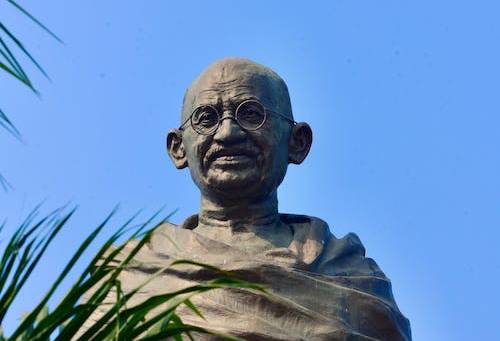Good Morning to all present here ,
Today, I stand before you to speak about a man who needs no introduction – Mahatma Gandhi. Mohandas Karamchand Gandhi, fondly known as the Father of the Indian Nation, was a leader, philosopher, and a symbol of nonviolent resistance. His life and teachings have left an indelible mark on the world, inspiring countless individuals and movements for peace, justice, and freedom.
 Born on October 2, 1869, in Porbandar, Gujarat, Gandhi grew up in a humble family but soon emerged as a beacon of hope and change. He studied law in England and then embarked on a journey that would shape the destiny of a nation. Gandhi’s ideology was rooted in the principles of truth, nonviolence, and justice.
Born on October 2, 1869, in Porbandar, Gujarat, Gandhi grew up in a humble family but soon emerged as a beacon of hope and change. He studied law in England and then embarked on a journey that would shape the destiny of a nation. Gandhi’s ideology was rooted in the principles of truth, nonviolence, and justice.
One of the defining moments of Gandhi’s life was his leadership in India’s struggle for independence from British rule. He advocated for nonviolent civil disobedience as a means to challenge oppressive systems. Through acts of peaceful resistance, such as the Salt March and the Quit India Movement, Gandhi mobilized millions of Indians and inspired a nation to rise against injustice.
Gandhi’s philosophy of nonviolence, or “Satyagraha,” was not just a political strategy; it was a way of life. He believed that nonviolence had the power to transform individuals and societies. He urged people to confront their adversaries with love and understanding, rather than hatred and violence. His unwavering commitment to nonviolence set a powerful example and inspired movements for civil rights, freedom, and peace around the world.
Beyond politics, Mahatma Gandhi was an advocate for social justice and equality. He fought against discrimination based on caste, gender, and religion. He believed in the dignity and worth of every individual and championed the cause of untouchables, women’s rights, and religious harmony. His message of inclusivity and unity continues to resonate in our divided world.
Gandhi’s legacy extends far beyond his lifetime. His teachings on self-reliance, simplicity, and sustainable living are more relevant today than ever before. He emphasized the importance of living in harmony with nature and promoted the concept of “Swaraj” or self-governance. He advocated for rural development and the empowerment of local communities, recognizing that true progress lies in the well-being of every individual.
Mahatma Gandhi once said, “Be the change you wish to see in the world.” This quote encapsulates his belief in the power of individual actions to bring about social transformation. He believed that each one of us has the capacity to make a difference, no matter how small. His teachings inspire us to take responsibility for our actions and work towards a more just and compassionate society.
As we remember Mahatma Gandhi today, let us not only honor his memory but also strive to embody the values he stood for. Let us be agents of peace, justice, and positive change in our own lives and communities. Let us embrace the power of nonviolence, truth, and love to create a better world for future generations.
In conclusion, Mahatma Gandhi’s life and teachings serve as a guiding light for humanity. His unwavering commitment to truth, nonviolence, and social justice continue to inspire millions of people around the world. As we reflect on his remarkable legacy, let us be inspired to lead lives of purpose, compassion, and resilience. Let us carry forward the torch of peace and justice that Mahatma Gandhi lit, and let us strive to build a world that he envisioned—a world free from violence and filled with love, understanding, and equality.
Thank you.